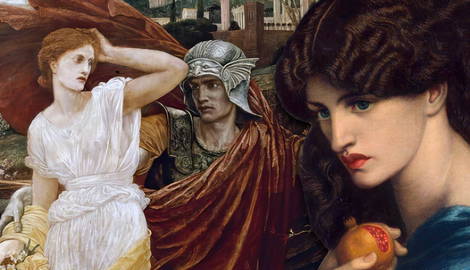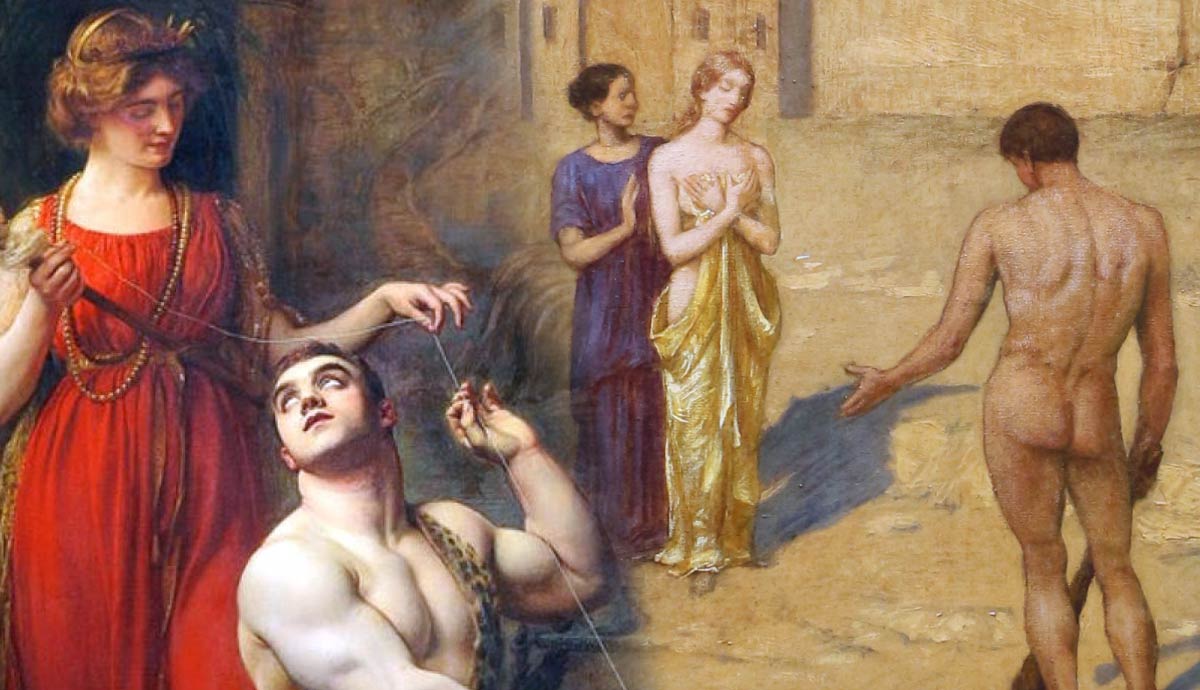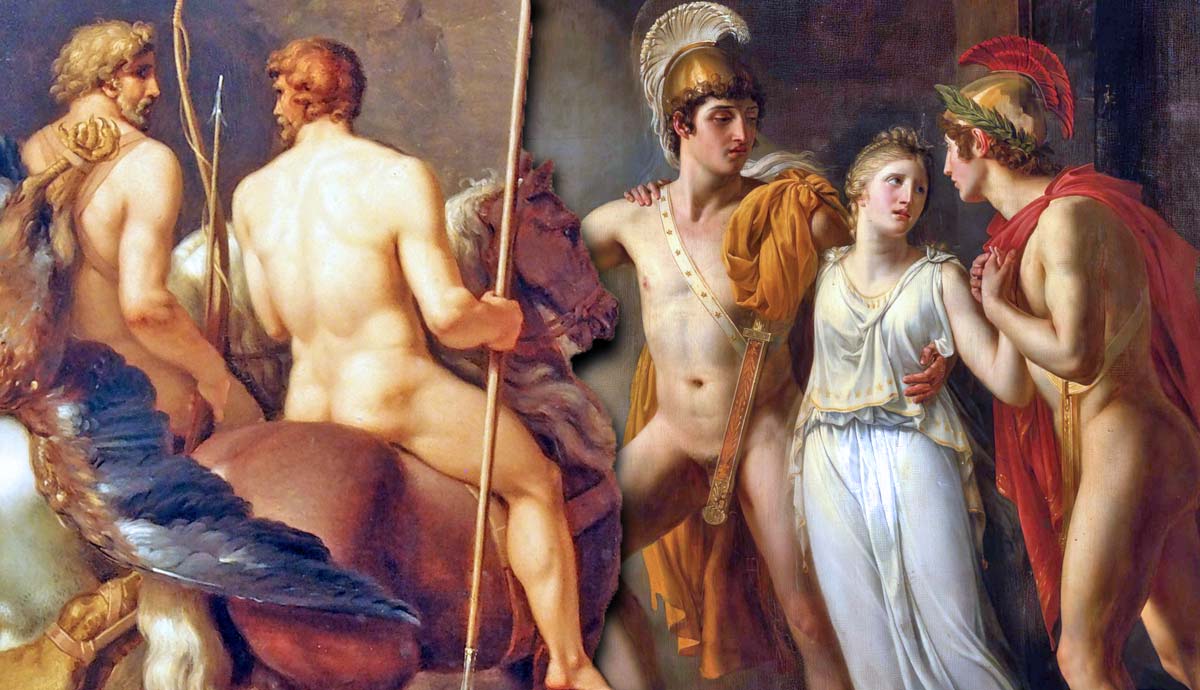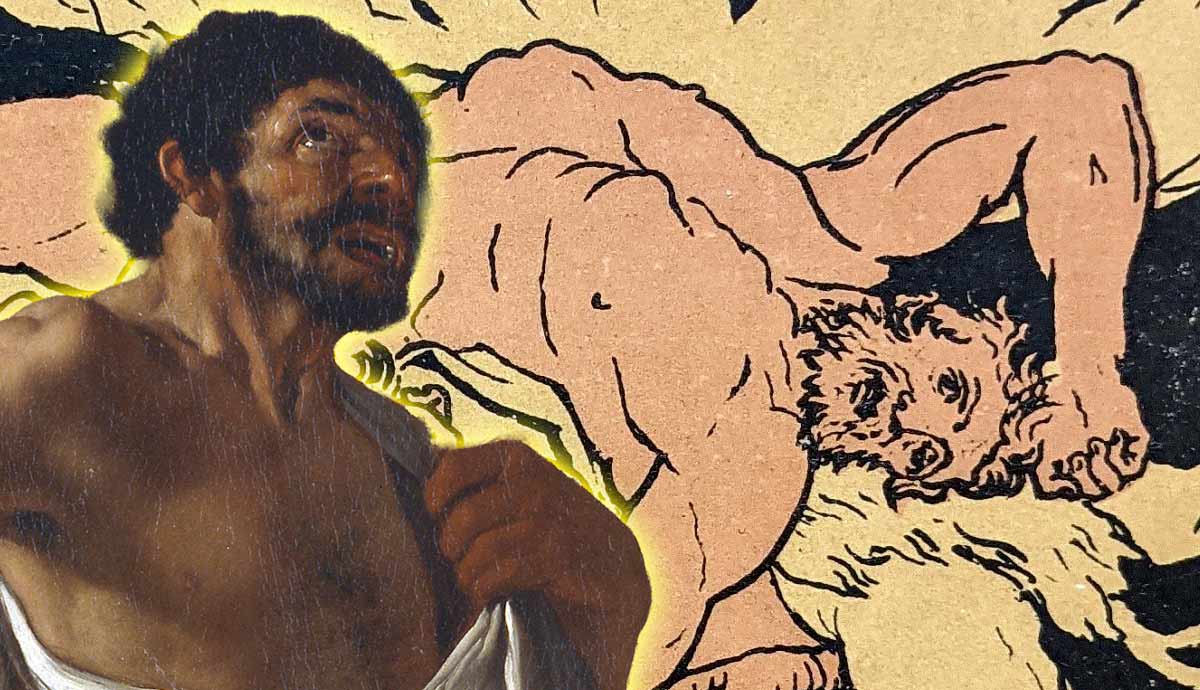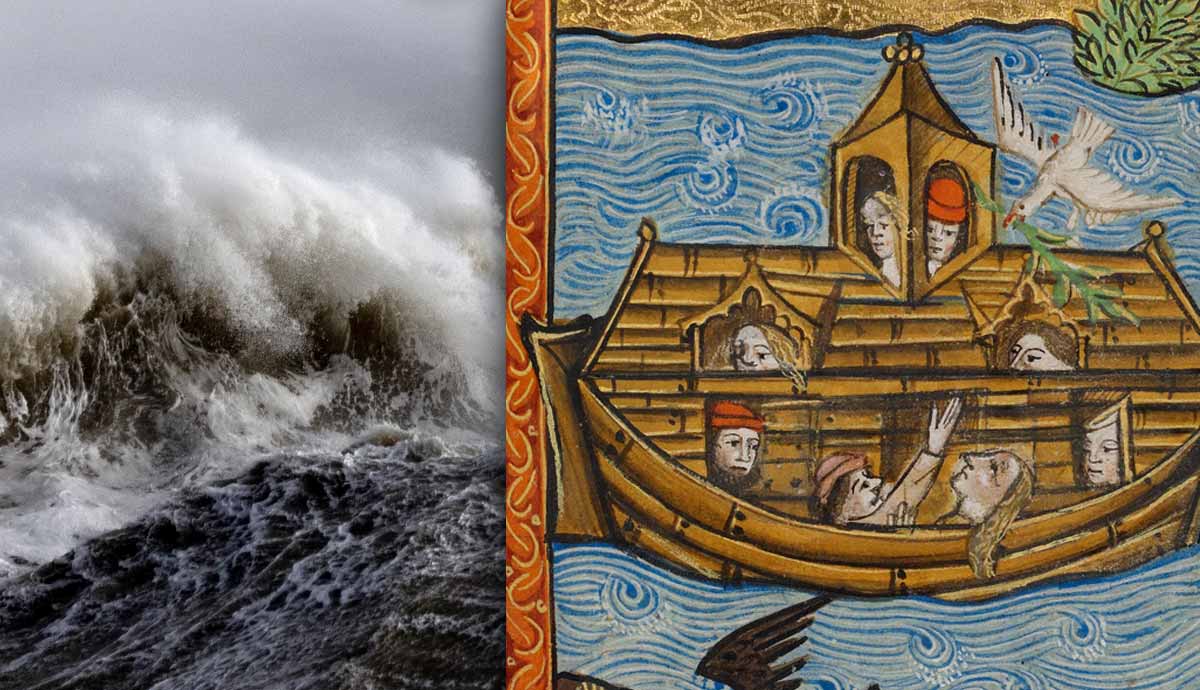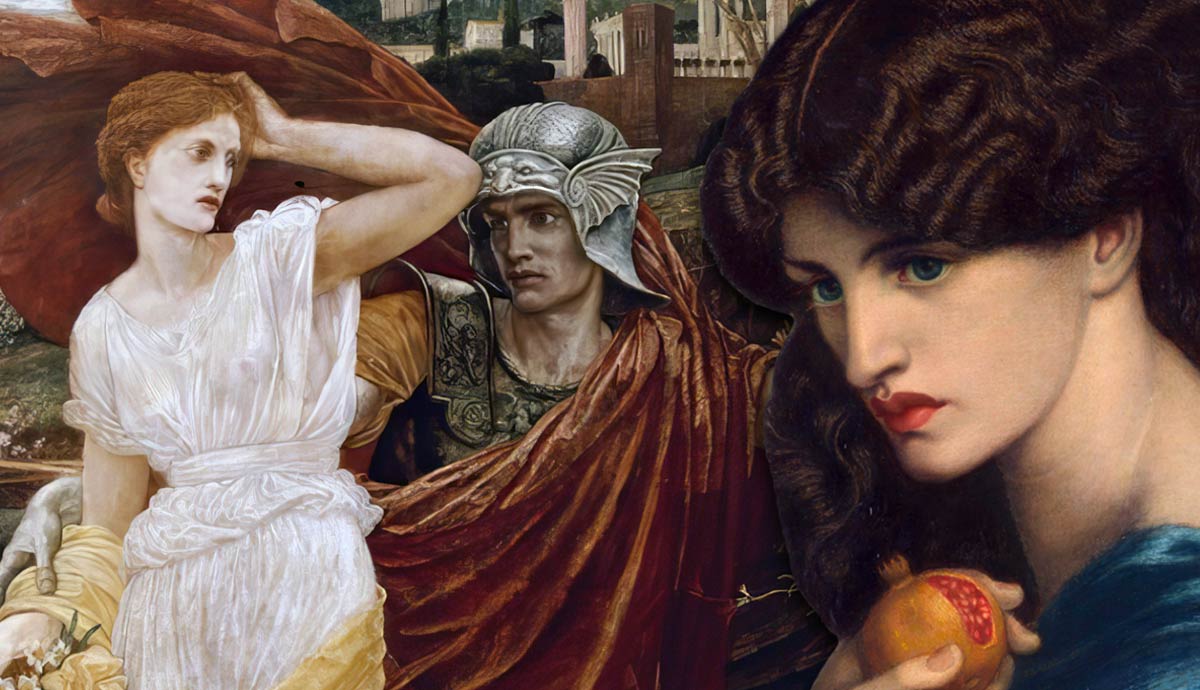
According to Greek mythology, there was a time when the world did not experience the decay of autumn and the cold of winter. Instead, summer, spring, and abundant growth were always present. Everything changed when Hades abducted Persephone, the daughter of Zeus and Demeter. Demeter neglected her duties as the goddess of agriculture and began searching the world for her daughter. Persephone’s abduction and Demeter’s search would forever change the natural world. Discover more about the abduction of Persephone and how it was used to explain the natural world.
The Maiden Persephone

Persephone was the only child of Zeus, the King of the gods, and Demeter, the goddess of agriculture, fertility, and the harvest. Before assuming the role of the queen of the Underworld, Persephone was known as Kore, “the maiden,” and was the goddess of spring and vegetation. She supported her mother, Demeter, and was associated with sprouting seeds and bringing forth new life. The mother and daughter duo were inseparable, and due to their close bond and shared domains, they were often collectively worshiped as the “Two Goddesses” or the “Two Demeters.”

The goddess Kore Persephone, a paragon of beauty and innocence, was often associated with love, womanhood, girlhood, and female rites such as childbirth and marriage. Her title “maiden” underscored her chastity, a quality fiercely protected by her mother, Demeter. Despite the attention of many gods, including Hermes, Hephaestus, Apollo, and Ares, Demeter ensured that no god or mortal came near her daughter. She was to live a life similar to those of other virtuous goddesses like Athena, Artemis, and Hestia. In some versions of the myth, Demeter’s overprotectiveness led her to hide Persephone on Earth, away from the leering eyes of Olympus.
The Abduction

With Demeter fiercely guarding her daughter against the men of Olympus, Persephone’s status as the chaste goddess of spring and vegetation seemed secure and everlasting. However, fate had other plans for Persephone. After taking control of the Underworld, Hades approached Zeus and complained that he lacked a suitable consort to rule alongside him. This complaint would set in motion a series of events that would forever change the natural world.
In some versions of the myth, Hades demands to marry Persephone after either seeing her roaming the fertile plains of the Earth or after being struck by Cupid’s arrow at the behest of Aphrodite. In many other versions, Zeus offers his daughter’s hand in marriage to appease the lord of the dead’s complaints.
Regardless, neither god wanted their overprotective sister, Demeter, nor Persephone to learn of the marriage agreement. Instead of announcing their plan, the brothers devised a way to ensure Persephone’s quiet, and consequently traumatic, transition to the underworld.

When Persephone was out gathering flowers with her attendants and friends, the Oceanids (the nymph daughters of the Titan Oceanus), Pallas (a warrior and a daughter of Triton), and Artemis (the goddess of the hunt), she noticed a marvelous radiant flower in the distance. The peculiar and beautiful flower emitted a sweeter and more delightful fragrance than any scent the vegetation goddess had ever encountered. Captivated by the allure of this mysterious plant, Persephone wandered away from the company of her friends to examine and gather this unusual flower.

As she knelt to pluck the plant, the earth around it cracked open, and Hades, the lord of the dead, burst forth from the darkness in a magnificent golden chariot. Seizing Persephone, he spirited her away, racing back to the depths of the Underworld. Persephone fought and screamed for help, desperately calling out to her companions, and her mother and father, but her pleas fell on deaf ears. Only the all-seeing Helios, god of the sun, and Zeus, who feigned ignorance, witnessed her abduction. Meanwhile, whether by fate or design, Hecate, the goddess of magic, ghosts, crossroads, and the night, caught wind of Persephone’s faint cries from her cave.
The Search

The sudden and mysterious disappearance of Persephone was noticed by her friends and attendants, who immediately began searching for her. Despite their efforts, they were unable to locate her. When Demeter found out about her daughter’s disappearance, she was overcome with panic and fear, experiencing the pain of losing a loved one. In her deep sorrow and anxiety, the goddess of the harvest began pulling out her beautiful golden hair as she wept for her daughter.
Demeter used her powers to give wings to Persephone’s nymph attendants to aid in the search for Persephone. Over time, these attendants became known as the Sirens—creatures with the lower bodies of birds and upper bodies of women who lured sailors to their deaths with their enchanting songs. Different versions of the myth offer various reasons for Demeter’s transformation of the attendants. In some versions, Demeter bestowed the wings to assist in the search, while in others, she transformed them as a punishment for neglecting their duties to care for and watch over Persephone.

Demeter’s search for Persephone consumed her as she scoured the earth, refusing to eat, drink, or bathe. None of the Olympians came to Demeter’s aid as she searched the world for nine days to no avail. However, on the tenth day, Hecate arrived bearing her two torches to help Demeter search for Persephone. Hecate had heard Persephone’s cries and had also been searching for her with no success. With torches in hand, Hecate suggested they ask Helios, the sun god who watches all that transpires between gods and men if he had seen what happened to Persephone.

Helios was an easy god to find, and Demeter and Hecate ascended toward the shining sun to question him. The god of the sun was happy to talk during his lonely task of dragging the sun across the sky. Helios revealed that ten days ago, he had seen Persephone seized by her brother Hades and taken to the Underworld in his golden chariot. Demeter was hit with a mix of emotions. She finally knew what had happened and where her daughter was, but the news of her brother Hades’s involvement angered and worried her.
Helios’s words swept aside Demeter’s conflicting emotions, leaving her feeling betrayed. He told her he had witnessed Zeus and Hades making a deal for Persephone to become Hades’s wife a few days before her abduction. The revelation that Zeus, Persephone’s father, had willingly allowed Hades to take their daughter behind Demeter’s back filled her with fury and disbelief. Zeus’s betrayal stunned Demeter, turning her heart and soul to ice as she struggled to accept this new reality.
The First Winter

The will of Zeus was absolute. Despite Demeter’s plea upon learning the truth of Persephone’s disappearance, her words alone could not convince Zeus to annul his marriage agreement with Hades. However, that did not mean Demeter had to accept Zeus’s will. She turned her back on Olympus, avoided all the Olympians, and neglected all her duties as a goddess. As a result, the earth grew hard and cold, crops began to wither and die, and the soil became infertile. For the first time in the still-young history of humankind, a cold and harsh winter arose that reflected the cold, broken, and betrayed heart of the once benevolent goddess of agriculture.
As farmers struggled to sow and grow new crops, Demeter roamed, consumed by bitter anger and grief. The goddess disguised herself as an older woman and aimlessly wandered across the infertile land. With crops failing and food reserves dwindling, people were less inclined to share what they had with passersby. However, when Demeter reached the city of Eleusis, she was warmly greeted and invited to eat and take shelter by Queen Metanira and King Celeus. In return for their kindness, disguised Demeter offered to become the wet nurse for their newborn son, Demophon.

After experiencing immense pain and grief over the loss of Persephone and Zeus’s betrayal, Demeter found some solace during her time in Eleusis. She formed a friendship with a fellow serving woman named Iambe. Iambe’s light-hearted nature and dirty humor helped ease the goddess’s depression, bringing laughter and smiles back into her life for the first time since Persephone’s abduction.
Demeter became very attached to Demophon as she nursed him for several months. Not wanting to lose another child to the land of the dead, she decided to make Demophon immortal. Every day, she would anoint Demophon with ambrosia, and every night, she held the infant over the roaring flames of the fireplace, using her powers to burn away his mortality. This was a delicate and time-consuming ritual, but unfortunately, it would never come to fruition.

Queen Metanira had grown suspicious of her elderly wet nurse’s nighttime activities. One night, she followed her to find out what she was doing. When the queen saw her child being held over the fire, she screamed, called for help, and demanded the wet nurse stop. For the first time in months, Demeter dropped her disguise, stood to her full height, and turned to Metanira, the foolish mortal who had dared to command her, an Olympian, to stop.
Without any context, Metanira’s response was understandable, but that did not stop Demeter from reprimanding her. Demeter explained to Metanira the gift she was trying to bestow on her son. However, Demeter withdrew her blessing because of the queen’s foolish meddling, and Demophon was fated to die like all other mortals.
In some versions, Metanira’s screams distract Demeter during the ritual, and Demophon tragically dies in the fire. Moreover, Demeter commanded the king and queen of Eleusis to construct a grand temple dedicated to her to appease her anger further. Eleusis would hold great significance for the worship of Demeter and her daughter.
The Cycle of Return

By the time Demeter left Eleusis, the world had been without access to agriculture and crops for months. As a result, a great famine spread across the globe, and countless people died of starvation. Although the Olympians did not need to eat, they did require worship and sacrifices in the form of food and livestock from humans. Without food to feed their starving families, let alone make sacrifices, humanity began crying out to the gods to end the great famine that seemed set on bringing about their extinction.
Demeter had ignored all the Olympians who attempted to see her since Persephone’s abduction. They then sent Iris, the messenger goddess of the rainbow, to speak to her. Despite Iris’s pleas, Demeter refused to listen or compromise. She made it clear that only one thing would change her mind: the return of her daughter.
Demeter backed Zeus into a corner, and the King of the gods had no choice but to yield to her will or face humanity’s extinction. Reluctantly, Zeus set aside his pride and instructed Hermes, the god of travel, merchants, messengers, and the guide of souls, to journey to the Underworld and negotiate Persephone’s return. Hades initially refused the demands, but Hermes clarified that Zeus threatened to deny Hades further access to the souls in his realm if he did not submit. Grudgingly, Hades agreed to return Persephone but demanded that he be allowed one more night with her. Hermes agreed, promising to return tomorrow to take Persephone back to Demeter.

After Hermes departed, Hades told Persephone she would return to her mother the next day. Hades, the god of the Underworld and wealth was greedy and detested anything, including his new wife, leaving his domain. So, Hades devised a plan to deceive the Olympians and Persephone. As a farewell gift, Hades gave Persephone six pomegranate seeds to eat. Persephone had been in the house of Hades for several months and had not eaten anything. She eagerly devoured all six seeds, enjoying their sweet, juicy flavor as she looked forward to reuniting with her mother.

Unfortunately, without Persephone’s knowledge, her act determined her fate as the Queen of the Underworld and influenced the fundamental structure of nature and the seasons. In Greek mythology, eating anything grown in the underworld was forbidden, and those who did were destined to spend eternity in the land of the dead.
Hermes was the god of boundaries, serving as both a Chthonic and Olympian deity with influence in both the realm of the living and the dead. This enabled the trickster to see through Hades’s deception and understand what had happened to Persephone when he came to retrieve her.

A compromise with Hades was necessary to bring Persephone back to the land of the living. Ultimately, Hermes and Hades reached an agreement: Persephone would stay in the Underworld for a number of months equal to the number of pomegranate seeds she had consumed. As a result, she would spend six months of the year in the Underworld as Hades’s wife and the other six months with Demeter in the land of the living. With the negotiations finally over, Hermes guided Persephone back to the surface, reuniting her with Demeter near her new temple at Eleusis.

After being separated for so long, Persephone and Demeter were finally reunited, allowing them to tend to their duties together. Demeter brought fertility and life back to the fields, while Persephone ended the long winter by ushering in a rejuvenating spring that brought new life and growth. However, after spending six months by her mother’s side, Persephone descended to Hades and ruled alongside her husband as the queen of the Underworld.
Each time Persephone left, Demeter would mourn and neglect her duties, resulting in the decay of autumn and winter. When Persephone returned, the mother and daughter duo would celebrate by ushering in spring, renewing life, and bringing the warmth of summer.

The abduction of Persephone and her cyclical return became an etiological myth that explained the changing seasons in Greek mythology. The Two Goddesses were at the center of worship in the Eleusinian Mysteries, celebrating and honoring the cycle of death and renewal each season brings. Participants supposedly reenacted Persephone’s descent to the underworld and her return to reunite with Demeter.
